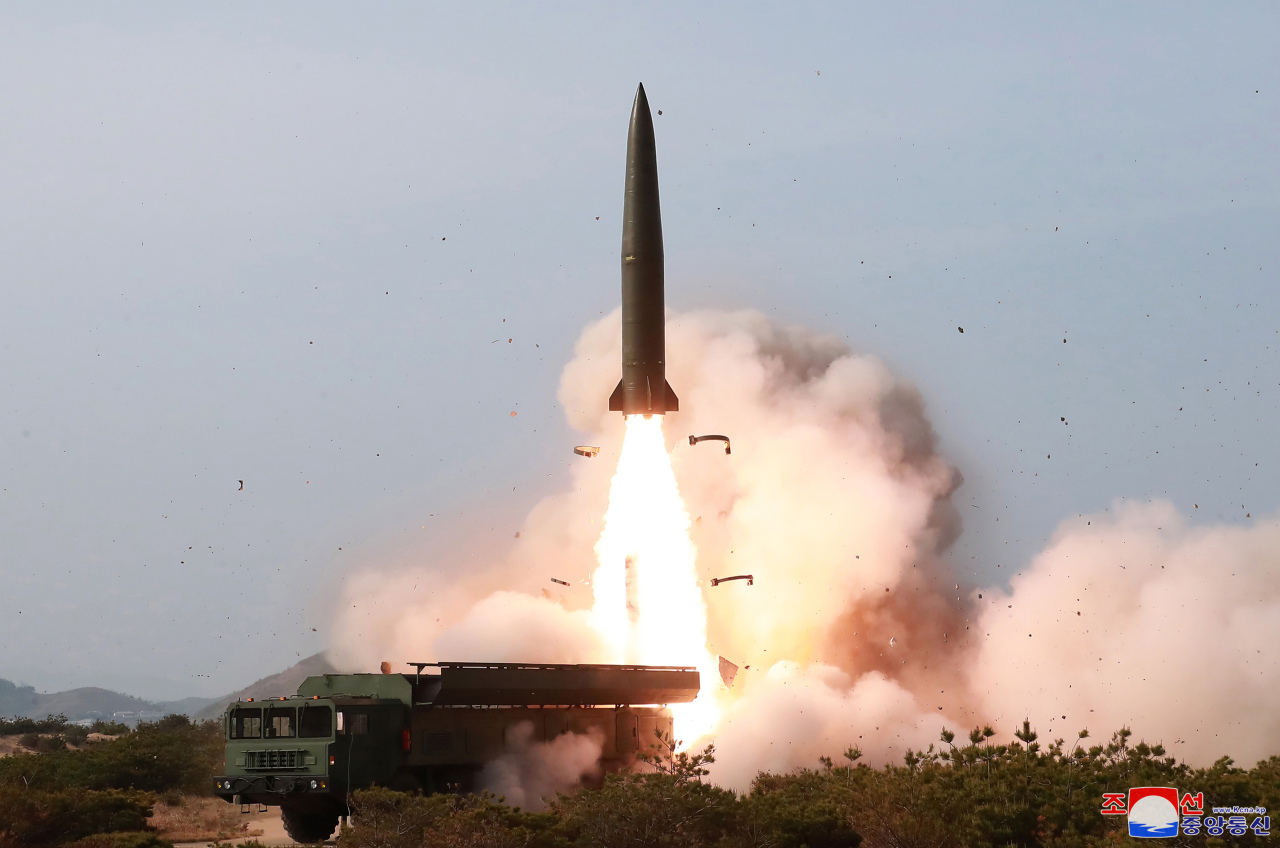North Korea’s projectiles ploy to pressure US in negotiations: spy agency
By Jo He-rimPublished : May 6, 2019 - 15:18
North Korea’s recent launch of projectiles could have been a move to pressure rival states and may not be a signal that it wants to break off negotiations, South Korea’s spy agency told lawmakers during a parliamentary briefing on Monday.
Pyongyang also appears to be adjusting the intensity of the message it is sending to the US, Rep. Lee Hye-hoon, head of the intelligence committee, told reporters after a parliamentary session with the National Intelligence Service here.
Pyongyang also appears to be adjusting the intensity of the message it is sending to the US, Rep. Lee Hye-hoon, head of the intelligence committee, told reporters after a parliamentary session with the National Intelligence Service here.

North Korea fired multiple projectiles from its east coast town of Wonsan into the East Sea on Saturday. The North’s Korean Central News Agency said the regime conducted a “strike drill” for multiple rocket launchers and a tactical guided weapon to test their performance under the supervision of North Korean leader Kim Jong-un.
The South’s spy agency also said the projectiles appear to have been launched from a ground-to-ground weapons system. Seoul’s Defense Ministry had previously said the projectiles appeared to include a new tactical guided weapon and 240-millimeter and 300-mm multiple rocket launchers. The projectiles flew between 70 kilometers to 240 kilometers, the ministry added.
On Sunday, US Secretary of State Mike Pompeo reiterated the desire to reach a “peaceful resolution” of North Korea issues, as Seoul and Washington appear cautious over confirming details of projectiles launched by the North last week.
Although they are still determining details of the projectiles, Pompeo said they are highly confident they were neither intermediate-range nor intercontinental missiles.
“I extend my hand to continue those negotiations. We want to continue to work towards a peaceful resolution to achieve denuclearization, fully verified, in North Korea,” Pompeo said in an interview with Fox News on Sunday.
“We’ll have to take a look. We know our objective. The moratorium was focused, very focused, on intercontinental missile systems, the ones that threaten the United States for sure,” Pompeo said when asked whether Pyongyang has violated its self-imposed moratorium.
If the projectile proves to be a ballistic missile, Saturday’s launch would be the first ballistic missile test or drill conducted by Pyongyang since 2017. Pyongyang declared in April 2018 that it would not launch missiles anymore, saying it had “completed” with its weapons development. The communist regime has since maintained the moratorium.
Following North Korea’s drill, US President Donald Trump tweeted Saturday to curtail speculation that negotiations were off.
“Anything in this very interesting world is possible, but I believe that Kim Jong Un fully realizes the great economic potential of North Korea, & will do nothing to interfere or end it. He also knows that I am with him & does not want to break his promise to me. Deal will happen!”
With the US and South Korean governments yet to confirm the exact nature of the projectiles launched, experts have raised the possibility that the weapon may be similar to -- or is -- the Iskander, a Russian tactical ballistic missile.
If North Korea did launch its own version of the Iskander, it could be in violation of the UN Security Council resolution that bans Pyongyang from all kinds of ballistic missile launches.
The sudden launch also appears to be a clear warning to the United States, experts say, amid stalled talks on denuclearization. The latest summit between Trump and Kim ended without striking an accord.
Amid the tense atmosphere, Seoul’s presidential office raised concerns that the launch of the projectiles may be in violation of an inter-Korean military pact and urged Pyongyang to stop actions that elevate tension on the Korean Peninsula.
The two Koreas signed the Comprehensive Military Agreement on Sept. 19, 2018, aimed at halting all “hostile acts.”
Meanwhile, Japan seems to be refraining from making strong remarks against the North, as it actively seeks a summit with North Korea.
According to news outlets there, the Japanese government has refrained from denouncing Pyongyang, saying it has not been determined whether the communist regime’s projectiles breached UN resolutions, and it is “carefully watching” the situation.
By Jo He-rim (herim@heraldcorp.com)


![[AtoZ into Korean mind] Humor in Korea: Navigating the line between what's funny and not](http://res.heraldm.com/phpwas/restmb_idxmake.php?idx=644&simg=/content/image/2024/04/22/20240422050642_0.jpg&u=)

![[Exclusive] Korean military set to ban iPhones over 'security' concerns](http://res.heraldm.com/phpwas/restmb_idxmake.php?idx=644&simg=/content/image/2024/04/23/20240423050599_0.jpg&u=20240423183955)

![[Herald Interview] Why Toss invited hackers to penetrate its system](http://res.heraldm.com/phpwas/restmb_idxmake.php?idx=644&simg=/content/image/2024/04/22/20240422050569_0.jpg&u=20240422150649)
![[Graphic News] 77% of young Koreans still financially dependent](http://res.heraldm.com/phpwas/restmb_idxmake.php?idx=644&simg=/content/image/2024/04/22/20240422050762_0.gif&u=)







![[Exclusive] Korean military to ban iPhones over security issues](http://res.heraldm.com/phpwas/restmb_idxmake.php?idx=652&simg=/content/image/2024/04/23/20240423050599_0.jpg&u=20240423183955)



![[Today’s K-pop] Ateez confirms US tour details](http://res.heraldm.com/phpwas/restmb_idxmake.php?idx=642&simg=/content/image/2024/04/23/20240423050700_0.jpg&u=)